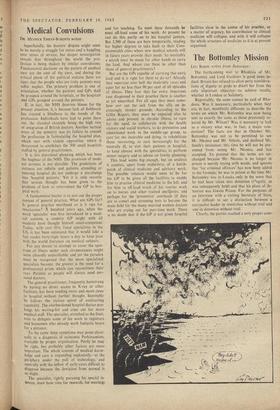Medical Convulsions
DR. MEYRICK EMRYS-ROBERTS writes:
Superficially, the doctors' dispute might seem to be merely a struggle for status and a haggling over terms of service, but deeper investigation reveals that throughout the world the pro- fession is being shaken by similar convulsions.
Fundamental decisions on the pattern of medical care are the cost of the cure, and during the critical phase of the political malaise there are signs that the people who are truly patients may suffer neglect. The primary problem is one of orientation, whether the patients and GPs shall be grouped around the hospitals, or the hospitals and GPs grouped around the patients.
If, in fact, the NHS deserves blame for the present situation, it is because lack of fieldwork has created a blindness to the trends of the profession. Individuals have had to point these out, the classical example being the high rate of emigration of British doctors. Another tactical error of the ministry was its failure to consult the profession in formulating the hospital plan, which met with violent opposition where it threatened to annihilate the 500 small hospitals staffed by general practitioners.
It is this piecemeal planning which has been the bugbear of the NHS. The provision of medi- cal services is not divisible. The gradations of sickness are infinite and patients attending or entering hospital do not undergo a sea-change into 'hospital patients.' Yet it is only recently that serious thought has been given to the problem of how to reintroduce the GP to hos- pital work.
A fundamental matter is to sort out the proper content of general practice. What are GPs for? Is general practice moribund or is it ripe for
renaissance? A hundred years ago, when the word 'specialist' was first introduced in a medi- cal context, a country GP might with all modesty have thought himself omni-competent. Today, with over fifty listed specialities in the US, it has been estimated that it would take a fast reader forty-eight hours a day to keep pace with the world literature on medical subjects.
For any doctor to attempt to cover the spec- trum of illness under such circumstances might seem absurdly unjustifiable, and yet the paradox must be recognised that the more Specialised specialists become, the greater is the need for a professional prism which can reconstitute their rays. Patients as people will always need per- sonal doctors.
The general practitioner, frequently hamstrung by having no direct access to X-ray or other facilities, has been sending more and more cases to hospital, without further thought. Inevitably he follows the vicious spiral of contracting capability. The overburdened hospital doctor pro-
, longs his waiting-list and cries out for more medical staff. The specialist, stretched to the limit,
tries to delegate some of his work to registrars and housemen who already work fantastic hours for a pittance.
To the cynic these symptoms may point classi- cally to a diagnosis of economic Parkinsonism, tractable by proper organisation. Partly he may be right, but probably other factors are more important. The whole content of medical know- ledge and care is expanding explosively—at the periphery under the pull of •technology, and centrally with the inflow of early cases difficult to diagnose because the deviation from normal is so slight.
The specialist, rightly pursuing his special in- terests, must have time for research, for meetings and for teaching. To meet these demands be must off-load some of his work. At present he can do this partly on to his hospital juniors. But 3,500 of these are here temporarily, reading for higher degrees to take back. to their Com- monwealth cities where new medical schools will in future years provide their needs. So inevitably a search must be made for other hands to carry the load. And whose can these be other than those of general practitioners?
But arc the GPs capable of carrying this extra load and is it right for them to do so? Already they supervise over half the maternity cases and cater for no less than 90 per cent of all episodes of illness. They fear that for every important case diagnosed in their practice there is another as yet unearthed. For all ages they must some- how sort out the sick from the silly on in- creasingly slender grounds. According to the Gillie Report, they must be expected also to advise, and prevent in chronic illness, to care for the aged, to collaborate with the health visitors and social workers, to do preventive and educational work in the middle-age group, to care for the incurable and dying, to rehabilitate those recovering, . to care increasingly for the mentally ill, to visit their patients in hospital, to keep abreast with the specialties, to perform minor surgery and to advise on family planning.
This load seems big enough, but on analysis it consists, apart from midwifery, of a hotch- potch of clinical medicine and advisory work. The possible solution would seem to be for the GP to be given all the facilities, to enable him to practise clinical medicine to the hilt, and for him to off-load much of his routine work on to nurses and other trained ancillaries; and perhaps for the 'preventive' overhauls (if they are to come) and screening tests to become the main field for the many married women doctors who are crying out for part-time work. There is no doubt that if the GP is not given hospital facilities close to the centre of his practice, as a matter of urgency, his contribution to clinical medicine will collapse, and with it will collapse the whole structure of medicine as it is at present organised.


































 Previous page
Previous page